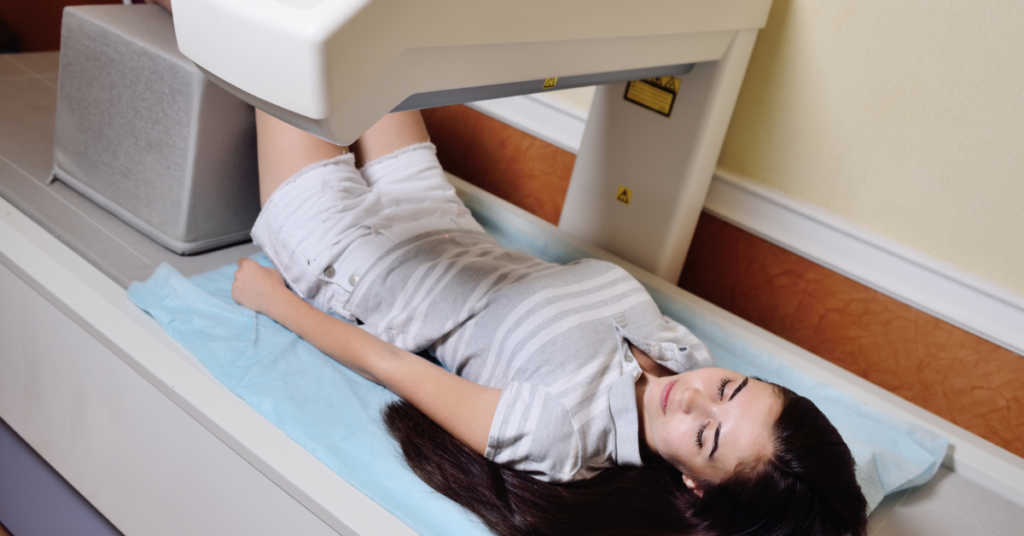When it comes to accurately assessing your body composition, not all methods are created equal. While various techniques exist, one stands out as the gold standard: Dual-Energy X-ray Absorptiometry (DXA). In this guide, we’ll explore how DXA technology compares to other popular methods, shedding light on its advantages in terms of accuracy, safety, cost, and the invaluable insights it provides.
Skinfold Calipers: The Traditional Approach
One of the most widely used and cost-effective methods for estimating body fat percentage is the skinfold caliper technique. This method involves pinching and measuring the thickness of subcutaneous fat at specific sites on the body, such as the abdomen, thigh, and triceps. While convenient and inexpensive, skinfold measurements are subject to significant variability due to factors like the technician’s experience, the caliper type, and the individual’s hydration levels.
Skinfold calipers only provide an estimate of overall body fat percentage, failing to differentiate between different types of fat (visceral vs. subcutaneous) or offer insights into muscle mass and bone density. This limitation makes it challenging to develop targeted fitness and nutrition plans based on the results.
Bioelectrical Impedance Analysis (BIA): Convenience at a Cost
Bioelectrical Impedance Analysis (BIA) is another popular method for assessing body composition. It works by sending a low-level electrical current through the body and measuring the resistance, or impedance, to that current. This resistance varies depending on the composition of the body’s tissues, allowing the device to estimate body fat percentage, muscle mass, and total body water.
While BIA devices are widely available, affordable, and convenient for home use, their accuracy can be compromised by factors such as hydration levels, recent physical activity, and the presence of certain medical conditions. Additionally, like skinfold calipers, BIA fails to provide detailed information about the distribution of fat and muscle throughout the body.
Hydrostatic Weighing: The Submerged Truth
Hydrostatic weighing, also known as underwater weighing or hydrodensitometry, is considered one of the most accurate methods for determining body composition. This technique involves weighing an individual both on land and while submerged in a specialized tank of water. By calculating the difference in weight due to water displacement, the individual’s body density can be determined, which is then used to estimate body fat percentage.
While highly accurate, hydrostatic weighing is a complex and time-consuming process that requires specialized equipment and trained personnel. It can also be uncomfortable for some individuals, as it involves complete submersion in water. Additionally, like other methods, it fails to provide detailed information about the distribution of fat and muscle throughout the body.
DXA: The Comprehensive and Precise Solution
Dual-Energy X-ray Absorptiometry (DXA) stands out as the gold standard for body composition analysis, offering unparalleled accuracy, safety, and comprehensive insights. This advanced technology uses two low-dose X-ray beams to precisely measure the amount of bone, muscle, and fat throughout the body, including the distribution of these tissues in specific regions.
One of the key advantages of DXA is its ability to differentiate between different types of fat, such as visceral (abdominal) fat and subcutaneous fat. This distinction is crucial, as visceral fat is associated with an increased risk of various health conditions, including heart disease, diabetes, and certain cancers.
In addition to providing detailed body composition data, DXA scans also offer valuable information about bone mineral density, which can help identify individuals at risk for osteoporosis or other bone-related conditions.
While DXA scans are more expensive than some other methods, they are generally considered safe, with minimal radiation exposure comparable to that of a standard X-ray. The procedure is quick, non-invasive, and can be performed by trained technicians in a clinical or research setting.
The Verdict: DXA Reigns Supreme
When it comes to accurately assessing body composition, DXA technology emerges as the clear winner. Its unparalleled precision, comprehensive insights, and ability to differentiate between various tissue types make it the gold standard for individuals seeking a detailed understanding of their body composition.
Whether you’re an athlete striving for peak performance, a fitness enthusiast tracking progress, or someone seeking to improve overall health, a DXA scan can provide invaluable data to guide your journey. While other methods like skinfold calipers, BIA, and hydrostatic weighing offer varying degrees of accuracy and convenience, they ultimately fall short in providing the level of detail and precision offered by DXA technology.
By investing in a DXA scan, you gain access to a wealth of information that can inform personalized nutrition and exercise plans, identify potential health risks, and empower you to make informed decisions about your well-being. So, if you’re serious about understanding your body composition and achieving your fitness goals, consider embracing the gold standard: DXA.
Unlock Your Body’s Potential with DXA Body Composition NC

If you’re ready to unlock the power of DXA technology and gain a comprehensive understanding of your body composition, look no further than DXA Body Composition NC in Durham, North Carolina. Our facility is equipped with the latest DXA scanning equipment, operated by Dr. Stewart.
At DXA Body Composition NC, we pride ourselves on providing personalized attention and expert guidance to help you interpret your scan results and develop a tailored plan to achieve your unique health and fitness goals.
Whether you’re an athlete seeking to optimize performance, a fitness enthusiast striving for your ideal physique, or someone committed to improving overall wellness, our team is dedicated to supporting you every step of the way.
Don’t settle for incomplete or inaccurate body composition data. Take the first step towards a healthier, more informed journey by scheduling your DXA scan with us today. Our convenient location in Durham, North Carolina, makes it easy to access this cutting-edge technology.
Contact us now to learn more about our services and embark on a transformative path to understanding your body like never before.
